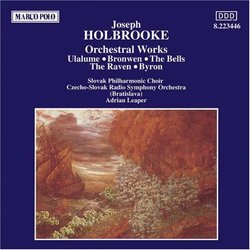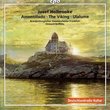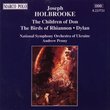| All Artists: Holbrooke, Leaper, Czecho-Slovak Rso Title: Ulalume / Bronwen / Bells / Raven Members Wishing: 0 Total Copies: 0 Label: Marco Polo Release Date: 7/19/1994 Genres: Special Interest, Classical Styles: Opera & Classical Vocal, Historical Periods, Modern, 20th, & 21st Century Number of Discs: 1 SwapaCD Credits: 1 UPC: 730099344623 |
Search - Holbrooke, Leaper, Czecho-Slovak Rso :: Ulalume / Bronwen / Bells / Raven
 | Holbrooke, Leaper, Czecho-Slovak Rso Ulalume / Bronwen / Bells / Raven Genres: Special Interest, Classical
|
Larger Image |
CD DetailsSimilar CDs |
CD ReviewsThe 'Cockney Wagner' now available on CD K. Farrington | Missegre, France | 03/14/2000 (5 out of 5 stars) "Joseph Holbrooke was an exact contemporary of Vaughan Williams, although his output is much more related to his youthful years. Whereas his more famous contemporary was fired by English folk music and the church music tradition, Holbrooke was stimulated by three areas. He was impressed by the Wagnerian Music Drama with its use of legends for sources with its opulent orchestral style. He was also interested in the ancient Welsh legends as a source for his own operas as Wagner took the mediaeval Germanic legends for his. Finally, Holbrooke was interested in the writings of Edgar Allan Poe as a source of material for his own fantastic musical imagination. Thus Holbrooke's orchestral music is either based on Welsh legend as, for example, the Bronwen overture which is taken from Holbrooke's operatic trilogy 'The Cauldron of Annwn'. This is a serious and atmospheric work of 9 minutes which shows that also shows some cross-fertilisation of ideas has occurred between the Welsh works and the Poe. 'The Raven' is based on Poe's weak and weary...' The music is full of sadness and despair and this is a much more substantial piece with unique orchestral effects and daring harmonies. 'The Bells' is again Poe inspired and the British Musical Establishment studiously ignored this work and yet played the Rachmaninov version based on the same material. I personally ask you to read the work and then play both versions and decide for yourself which is the most impressive! It would be fruitless to argue that Holbrooke was a composer of the first magnitude, he was not. He had a unique voice though and a orchestral style that commands attention from lovers of late romantic music. It is wonderful that the CD product enables the public to properly assess these works away from the so-called experts and paid commentators who have stultified the progress of good music because of their own prejudices following what is the dictum of the day. It is significant to me that with these new recordings of his work we have the Czecho-Slovak Radio Orchestra; could they not get a British orchestra to ever perform this composer's work? Holbrooke did not compose for the latter period of his life as the musical fashion had moved away from the world he wanted to depict. Perhaps now we will get the chance to properly assess him and maybe even hear his operas."
|

 Track Listings (5) - Disc #1
Track Listings (5) - Disc #1
